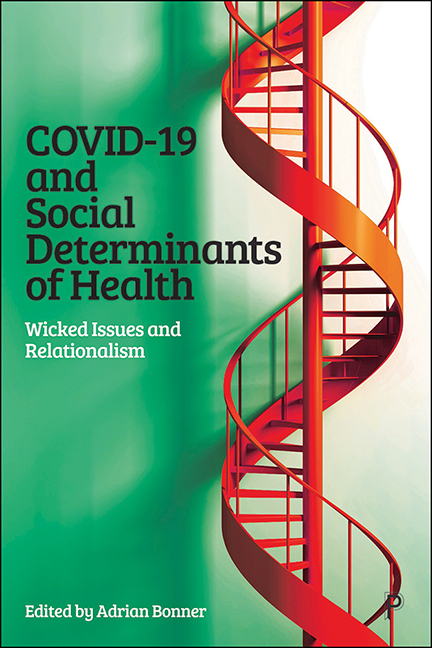Book contents
- Frontmatter
- Miscellaneous Frontmatter
- Contents
- List of figures and tables
- Notes on contributors
- Foreword
- Introduction
- Part I Wicked issues and relationalism
- Part II Regionalism and geopolitical environments
- Part III Public sector, COVID-19 and culture change
- Part IV The third sector
- Part V The case for relationalism
- Part VI Engagement and proposed changes
- Conclusion
- Appendix The Centre for Partnering
- Index
3 - Responding to the COVID-19 pandemic: a sociopolitical perspective
Published online by Cambridge University Press: 18 January 2024
- Frontmatter
- Miscellaneous Frontmatter
- Contents
- List of figures and tables
- Notes on contributors
- Foreword
- Introduction
- Part I Wicked issues and relationalism
- Part II Regionalism and geopolitical environments
- Part III Public sector, COVID-19 and culture change
- Part IV The third sector
- Part V The case for relationalism
- Part VI Engagement and proposed changes
- Conclusion
- Appendix The Centre for Partnering
- Index
Summary
Introduction
The COVID-19 pandemic, it has been claimed, poses the gravest threat to the health and livelihoods of the British people since 1945 (Crewe, 2020). It is impossible to understand the devastating impact of the virus across the UK involving significant loss of life, and the government’s much criticised response to it, without applying the lens of a sociopolitical perspective. The virus has cruelly exposed deep-seated and long-standing societal inequalities and deficiencies in the infrastructure of public services.
Following the successful vaccine rollout in the UK and growing confidence that a return to some form of normality is in sight, it is easy to overlook the incompetence of the government throughout most of 2020 and early 2021 (Calvert and Arbuthnott, 2021).
A substantial body of evidence exists to show that the virus has had a disproportionate impact on poor communities, and on care homes, reflecting widening health inequalities and the effects of deep public spending cuts since 2010 (Marmot, 2020a, 2020b; Marmot et al, 2020a). With over 200,000 deaths recorded as of 9 September 2022, the UK has suffered the highest number from the virus in Europe apart from Russia. It therefore comes as little surprise to conclude that the government’s response to the virus from the outset has been found wanting and overly reliant on a public sector infrastructure that has been significantly hollowed out following a decade of austerity as part of a deliberate policy to roll back the state and reduce the size of government. This in turn has reinforced problems already evident in regard to the persistence of a dysfunctional health and social care divide, an overcentralised system of governance, a preference for uncritical outsourcing to the private sector, and a tendency to regard the National Health Service (NHS) as a special case – an institution meriting protection – while ignoring the significant public health challenges facing local government that has borne the brunt of spending cuts. Indeed, as Aileen Murphie states (Chapter 9, this volume), ‘spending pressures have fallen most heavily on local authorities’ adult social care, housing and public health services’.
- Type
- Chapter
- Information
- COVID-19 and Social Determinants of HealthWicked Issues and Relationalism, pp. 56 - 69Publisher: Bristol University PressPrint publication year: 2023

